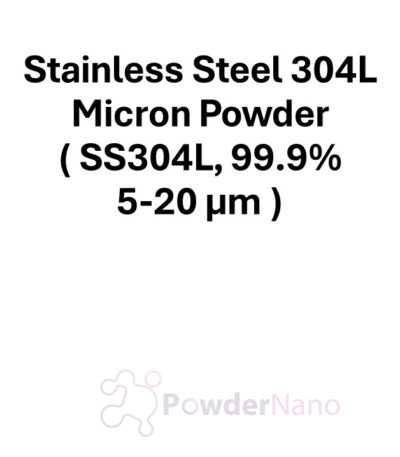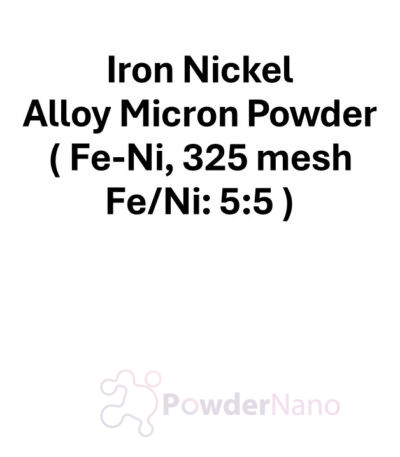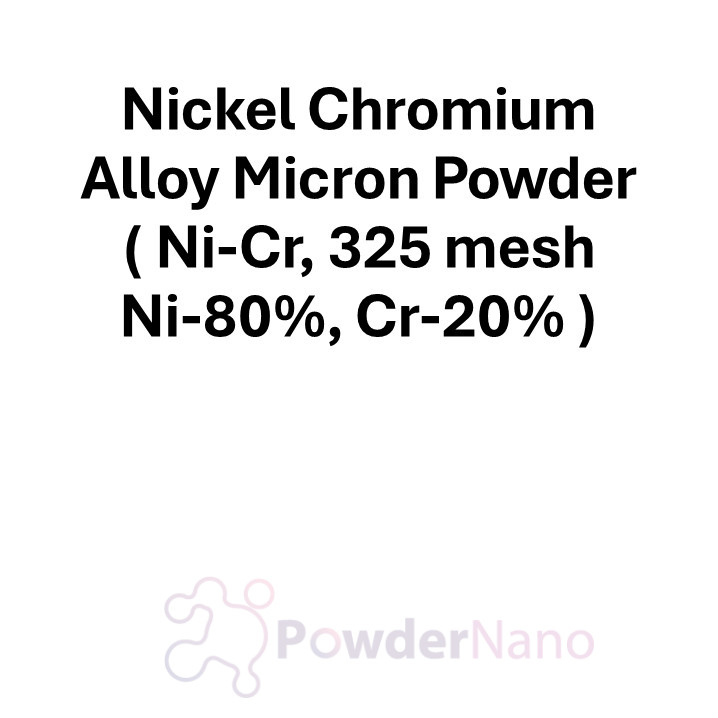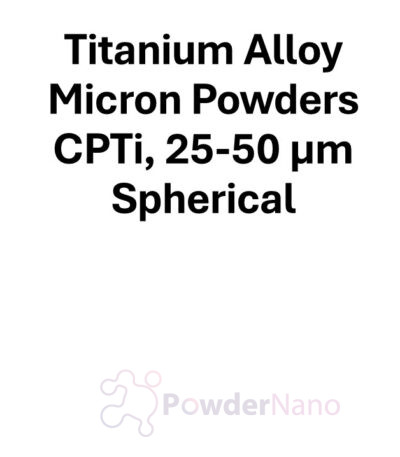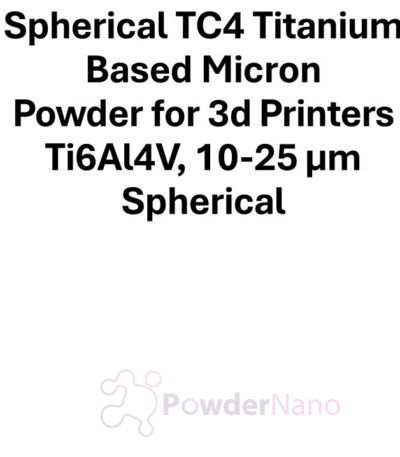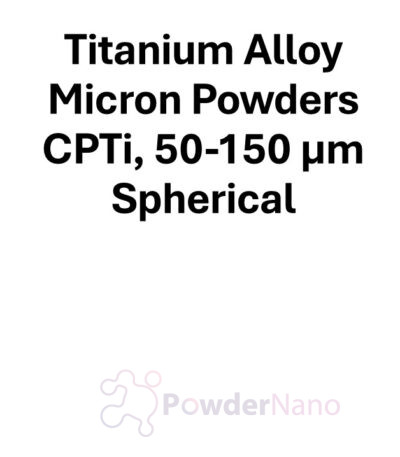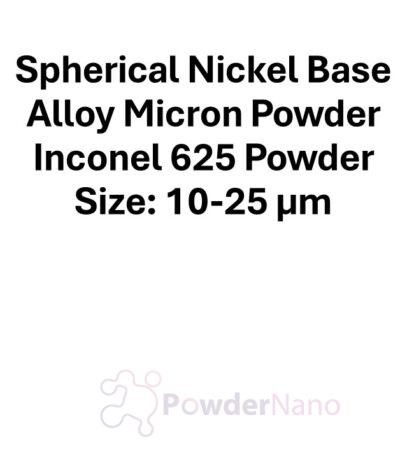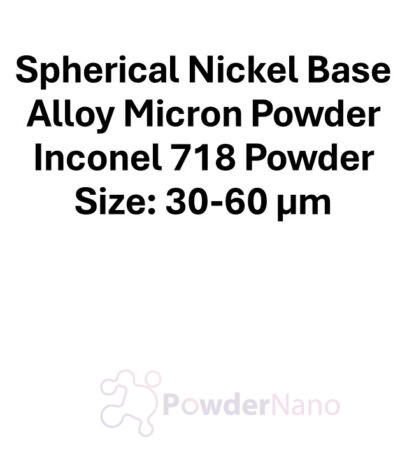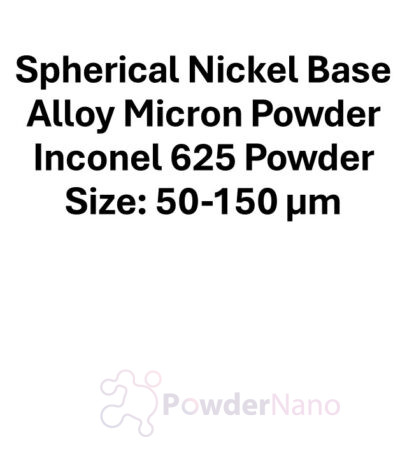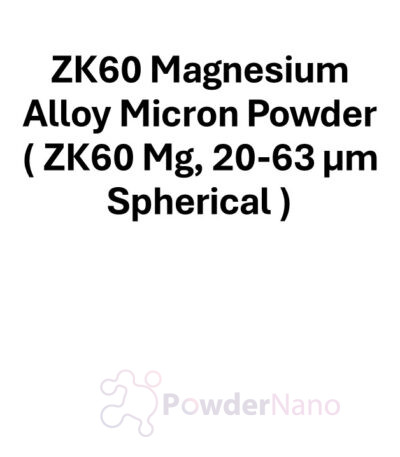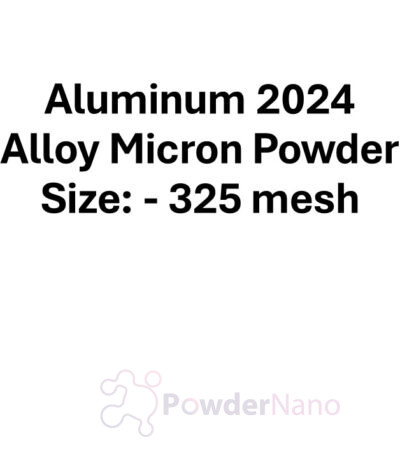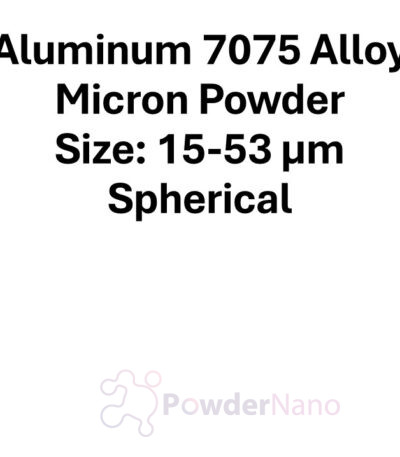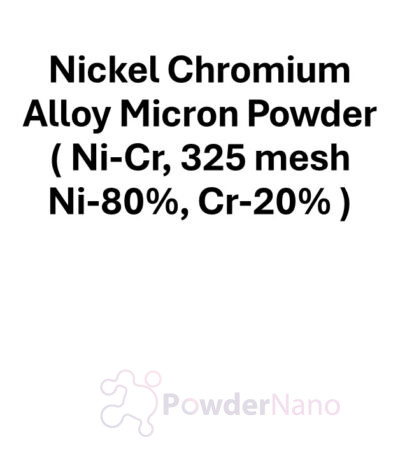Nickel Chromium Alloy Micron Powder (Ni-Cr, 325 Mesh, Ni-80%, Cr-20%)
Technical Specifications:
- Material: Nickel Chromium Alloy (Ni-Cr)
- Purity: Typically 99.9% (high purity)
- Particle Size: 325 Mesh (approximately <45 µm)
- Shape: Typically spherical or irregular (depending on manufacturing process)
- Density: Approximately 8.4 g/cm³
- Melting Point: 1,400–1,450°C (2,552–2,642°F) depending on composition
- Boiling Point: Does not have a specific boiling point (both elements decompose or sublimate at very high temperatures)
- Chemical Composition:
- Nickel (Ni): 80%
- Chromium (Cr): 20%
Applications:
- Powder Metallurgy:
- Nickel Chromium (Ni-Cr) Alloy Powder is used in powder metallurgy for the production of high-performance components. The powder is compacted and sintered to form precision parts for aerospace, automotive, electronics, and industrial applications.
- Components such as gears, valves, shafts, electrical connectors, and fittings benefit from the alloy’s high strength, corrosion resistance, and heat resistance.
- Additive Manufacturing (3D Printing):
- Ni-Cr alloy powder is widely used in metal 3D printing technologies such as Selective Laser Melting (SLM) and Laser Powder Bed Fusion (LPBF). The fine particle size ensures high-density, precise manufacturing of customized, high-strength components for industries such as aerospace, automotive, and electronic devices.
- This powder is ideal for applications requiring high resistance to heat, oxidation, and mechanical stress.
- High-Temperature Applications:
- The Nickel-Chromium alloy (Ni-80%, Cr-20%) is known for its high-temperature strength and oxidation resistance, making it ideal for components used in high-temperature environments. It is used in heat exchangers, turbine blades, furnace parts, and high-performance automotive components that are exposed to extreme temperatures.
- The micron powder is used to create heat-resistant components for use in thermal management systems, jet engines, and gas turbines.
- Electrical Resistance Heating Elements:
- Nickel Chromium alloys are commonly used in the manufacture of heating elements for electric furnaces, ovens, and industrial heaters due to their ability to withstand high temperatures without degrading.
- The Ni-Cr alloy powder can be used to produce high-performance resistance wires that provide reliable heating in resistive heating elements for industries such as appliance manufacturing, laboratory equipment, and electric heating.
- Corrosion-Resistant Components:
- Nickel Chromium alloys are highly resistant to corrosion and oxidation, making them ideal for use in environments exposed to harsh chemicals or extreme temperatures. The micron powder form is used in creating corrosion-resistant parts for chemical processing equipment, marine environments, food processing equipment, and pharmaceutical manufacturing.
- These parts include pumps, valves, seals, reaction vessels, and tanks where resistance to corrosive environments is critical.
- Automotive Components:
- The high strength and corrosion resistance of the Ni-Cr alloy make it suitable for automotive applications. Nickel Chromium alloys are often used for exhaust systems, fuel system components, engine parts, and turbocharger components.
- The micron powder is used in additive manufacturing to create custom, high-performance automotive components that require both strength and corrosion resistance, especially in high-heat applications.
- Electronics and Electrical Components:
- Nickel Chromium alloys are used in electronic components such as resistors, switches, capacitors, and electrical contacts due to their stable electrical properties and corrosion resistance. The powder is used to produce high-performance electrical components in precision instruments and power generation systems.
- The micron powder form is used for high-performance connectors and electrical contacts where low contact resistance and long-term stability are required.
- Sintered Parts for High-Performance Engineering:
- The Ni-Cr powder is used to create sintered parts for precision engineering applications. The powder is used in additive manufacturing and powder metallurgy to create high-performance, durable parts for use in aerospace, automotive, and medical devices.
- The sintered parts exhibit excellent high-temperature stability, mechanical strength, and oxidation resistance, making them suitable for demanding mechanical applications.
- High-Performance Sports Equipment:
- Nickel Chromium alloys are also used in high-performance sports equipment such as bicycle frames, skis, snowboards, and high-end sporting gear. The alloy’s combination of strength, light weight, and resistance to wear makes it ideal for products that need to withstand heavy usage while remaining lightweight.
- Industrial Machinery and Tools:
- Ni-Cr alloy is used to create machinery components such as cutting tools, pistons, cylinders, and engine parts due to its strength, thermal resistance, and corrosion resistance. It is widely used in industrial machinery exposed to high temperatures and stressful conditions.
- The micron powder is also used for tools requiring high durability and resilience under heavy mechanical loading.
- Research and Development:
- Nickel Chromium alloy powder is extensively used in research and development applications, particularly for new material exploration, advanced manufacturing techniques, and material behavior studies. The powder is used for testing powder metallurgy, additive manufacturing methods, and high-performance material development.
- It is particularly valuable in exploring new applications in extreme environments, including those that require high strength-to-weight ratios, corrosion resistance, and thermal stability.
Nickel Chromium Alloy Micron Powder (Ni-Cr, 325 Mesh, Ni-80%, Cr-20%) is a versatile and high-performance material used in a wide range of industries where corrosion resistance, high strength, and heat resistance are required. Its excellent properties make it ideal for additive manufacturing, powder metallurgy, and producing complex components in industries such as aerospace, automotive, electronics, chemical processing, and high-temperature applications. The micron powder ensures high precision and reliability in critical components that require durability under extreme conditions.
